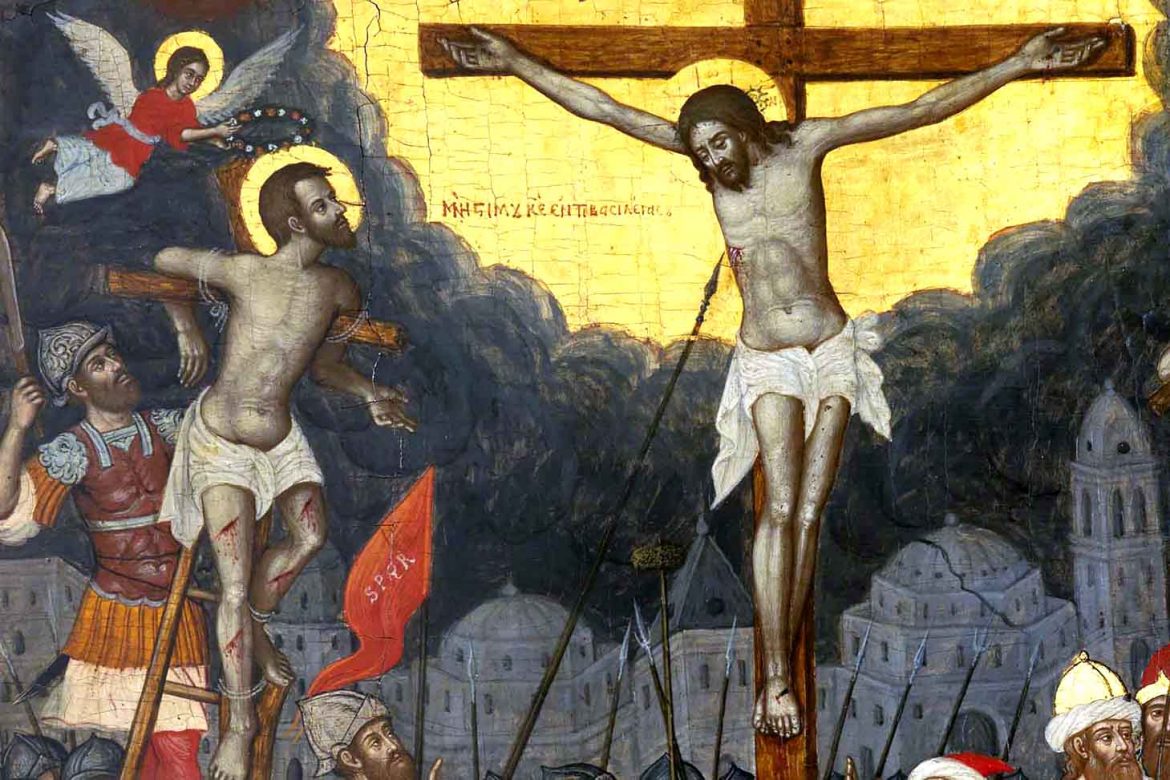I started thinking about how Mary would have reacted to the presence of the two thieves. She would not have been just a passive observer. She would have seen their suffering and have prayed for them. I think of St. Therese in the Story of a Soul, having read about a famous unrepentant murderer. Subsequently, she started to pray that he would show some sign of contrition before his execution. He did offer such a sign.
I have been thinking a bit about Mary’s role at the site of the crucifixion of her son. Specifically in regards to Dismas, the good thief. Whenever I thought about Dismas, it was always in the context of Jesus. I never really pictured Mary and the others there at the foot of the cross. My thinking about Calvary was odd as disconnected scenes.
I also wondered how another sword of sorrow for Mary was hearing the thieves reviling her son. Now there is some question as to whether both thieves reviled Jesus. Matthew and Mark seem to indicate they both did, while Luke infers only that the unrepentant thief did so. St. Augustine thought that Matthew was using a plural for the singular as done in Hebrews 11:33. Most of the Church Fathers interpreted that the repentant thief had initially reviled Jesus and was later converted. St. Ambrose thought that either interpretation was possible.
Either way, Dismas did have some conversion experience on his cross. Visually he would see Jesus suffering the same fate as himself. A man on his way to death. He would have seen Jesus’ reaction as totally different. Jesus was offering forgiveness to his persecutors. Ensuring his mother was taken care of by his disciple. He would have seen Jesus putting others as a priority. He would have recognized the reference to Psalm 22 as not a prayer of despair but the praise of God that it is. The good thief was open to seeing this in a way that the unrepentant thief did not. He admits to his sins and sees his punishment as just while reaching out to Jesus to be just remembered by him. An incredible act of faith. In such circumstances, to understand that Jesus was not only innocent but coming into a kingdom.
I can’t help but think that Mary played some role in her intercession for this man. When it comes to grace, it is always God that moves first. Dismas responded to that grace given him. God also allows us to play some role for others in how this grace might be accepted via our prayers. The interplay of grace, free will, and intercessions. Thus one was converted and the other not (as far as we know).
Venerable Fulton J. Sheen
“A dying man asked a dying man for eternal life; a man without possessions asked a poor man for a Kingdom; a thief at the door of death asked to die like a thief and steal Paradise. – Venerable
St. Augustine on Matthew 27:44.
(de Cons. Ev. iii. 16.) It may seem that Luke contradicts this, when he describes one of the robbers as reviling Him, and as therefore rebuked by the other. But we may suppose that Matthew, shortly alluding to the circumstance, has used the plural for the singular, as in the Epistle to the Hebrews we have, Hare stopped the mouths of lions, (Heb. 11:33.) when Daniel only is spoken of. And what more common way of speaking than for one to say, See the country people insult me, when it is one only who has done so. If indeed Matthew had said that both the thieves had reviled the Lord, there would be some discrepancy; but when he says merely, The thieves, without adding ‘both,’ we must consider it as that common form of speech in which the singular is signified by the plural.
St. Ambrose
But it must also be explained how the others, that is, Matthew and Mark, introduced two thieves reviling, while Luke, one reviling, the other resisting him. Perhaps this other at first reviled, but was suddenly converted. It may also have been spoken of one, but in the plural number; as in the Hebrews, They wandered in goat-skins, and they were sawn asunder; (Heb. 11:37.) whereas Elijah alone is related to have had a goat-skin, and Isaiah to have been sawn asunder. But mystically, the two thieves represent the two sinful people who were to be crucified by baptism with Christ, (Rom. 6:3.) whose disagreement likewise represents the difference of believers.

